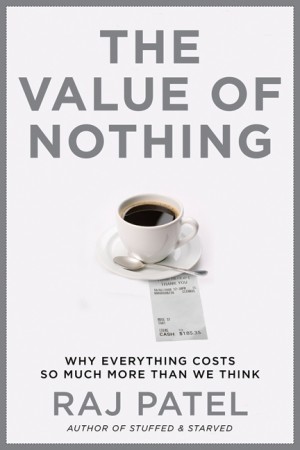Tim’s Book Choice for February 2012
 “The Value of Nothing” – Raj Patel
“The Value of Nothing” – Raj Patel
Of all the books on economics that I have read,
"The Value of Nothing" by Raj Patel probably comes the
closest to representing my own views. Patel focuses on the
failure of market prices to reflect actual human values as
a central problem of our economic system.
The reason I associate so closely with this book is that for
Patel, a genuine understanding of economics leads to the
necessity of a powerful social movement to overthrow the
existing order. For me, understanding how our economy really
works was a key factor that pushed me into serious activism.
Patel outlines a similar path that weaves together the reality
of our economic, political and corporate systems. Ironically, one of the areas where I think Patel falls short
is on climate change. While he appropriately points out the problems with cap and trade, he treats cap
and trade as synonymous with "putting a price on carbon." Pricing carbon is no more synonymous with cap
and trade than hoof beats are synonymous with unicorns. Cap and trade has always been a way to AVOID
putting a real price on carbon with a carbon tax. Patel's confusion shows the massive damage done to the
climate movement by the US Climate Action Partnership. USCAP was a coalition between multinational
corporate polluters, like DuPont and Shell, and Big Green groups like NRDC and the Sierra Club.
USCAP hijacked the discussion about climate solutions in 2007 and forced real solutions, like a carbon tax,
out of the discussion. When we had our last best hope of avoiding climate catastrophe back in 2009,
USCAP was perhaps the single biggest reason that we failed. Its example of cooptation should always be
remembered as a warning to social movements. Patel has a strong background in food issues, so revolutionizing our food economy is a big example
throughout the book. Patel's solutions generally revolve around building genuine democracy and local
empowerment. He emphasizes the need for civil disobedience against the power structures that stand in the
way of local solutions. He celebrates the case of the Kingsnorth 6, which was a big inspiration for me in
2008 to try to use criminal trials to focus on climate change. In a footnote, he even mentions
"action offsets," which is an idea that Ashley Anderson gave to the Yes Men at a bar in Telluride.
This is the best book I've read in a while, and it shows how the climate justice movement could be more
effective with a solid foundation of good economics.
These are some of my favorite quotes from the book: Asking for patience "is a way of demobilizing popular demands, and of letting governments wriggle out of
providing anything at all, while suggesting that the cardinal duty of being a citizen is to wait with an
outstreched hand." -p.117 "One of the rights movements are fighting for is the right to make and learn from their own mistakes,
rather than suffer someone else's--and it works." p.124 "Turning dissenters into criminals doesn't happen by magic - it happens because today's market society has
an ideology in which those who challenge the fragile consensus around the role of the market cannot be
tolerated. The activist Abbie Hoffman once observed, 'You measure democracy by the freedom it gives its
dissidents, not the freedom it gives its assimilated conformists.' By that metric, there's not much
democracy around." p.177 On the Kingsnorth 6: "It's no small matter that the game-changing legal decision lay in the hands not of
government bureaucracy or the power company's accountants, but of twelve ordinary and anonymous men and
women. In the jurors' deliberations, in their meetings, they exercised virtues of reason and freedom that
hint at what a proper democracy, where people are able to craft the terms on which value is set, might
look like." p.178
Until then, check out this amazing video with Raj Patel.
Leave a Reply